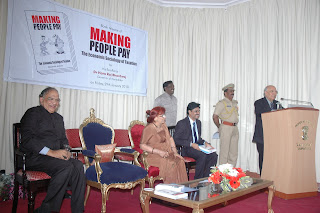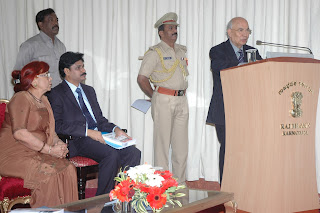Excerpts from the address of His Excellency the Governor of Karnataka
Tax is generally viewed by many as a necessary evil. However no society can achieve equitable progress without a fair and efficient tax system. I am happy to see all of you today for this book release function and it can be rightly gauged that the subject ‘economic sociology of taxation’ is an interesting area to many. On going through the manuscript of this book, I found that Mr Mathew has focused on the subject of tax compliance and tax evasion with an economic-sociological perspective.
Indian Constitution has rightly given a great a great deal of latitude to the Parliament in the matter of classification of objects and purposes of taxation. The court adopts a constructive and tolerant attitude towards the tax laws. The courts assert that in view of the intrinsic complexity of fiscal adjustments of diverse elements, a legislature ought to be permitted a larger discretion and latitude in the matter of classification for taxing purposes. Court interferes only when there is unreasonableness in the rules or its implementation. The political context of taxation has been analyzed with a global perspective by Mr. Mathew in this book. Article 38(1) of the constitution of India directs the state to strive ‘to promote the welfare of the people by securing and protecting as effectively as it may a social order in which justice, social, economic and political, shall inform all the institutions of the national life’. Article 39(c) of the constitution contemplates measures for preventing concentration of wealth and means of production in a few private hands. Taxation is one of the mechanisms to achieve this.
As it is argued in this book as well, taxation is becoming more and more complex as the economy gets complex with the rapid rise in business opportunities. The challenge before the tax administrators is to make it as simple and transparent as possible for the tax payers because complexity should not be a reason for tax non-compliance. India cannot have an untaxed parallel economy in the globalized world.
The book 'Making People Pay' gives insights to the issues of tax evasion and tax enforcement. I hope this book will help in giving a clear understanding of the subject to the readers.
Book release function
The book 'Making People Pay: Economic Sociology of Taxation' was released by His Excellency Hans Raj Bharadwaj, Governor of Karnataka, in the presence of Mrs Hans Raj Bharadwaj and Shri T S Krishnamurthy, Chief Election Commissioner of India. Also in picture, author Dr Sibichen K Mathew
Lady Governor Smt Hans Raj Bharadwaj launching the book blog. Also seen, His Excellency the Governor of Karnataka
Dr Vanita Mathew welcoming His Excellency the Governor
Master Nirmal Mathew welcoming Shri T S Krishnamurthi, Former
Chief Election Commissioner of India
Author: A few words about the book
His excellency giving a special honour to the mother of the author
Mrs Thresiamma Thomas and requested her to have a photograph with him
Dr Vanita Mathew proposing the vote of thanks
Seen in the photo: Hormis Tharakan, former DGP Kerala, Mrs and Mr Bhattacharya , former Chief Secretaries, Govt of Karnataka with Mrs Sharada Subramanian, Secretary to Governor
Mr M L Agarwal IRS, Mr N P Singh IRS (Chief Commissioners of Income Tax) with Mr B J Chacko, Former Member, CBDT
Dignitaries, Senior Officers, Friends, and Relatives
High Tea with Governor
Huge demand for the copies signed by the author
Cheers from Ramasubramanian, Rtn Mahaveer Jain, and Rtn Dr PC Thomas
My friends who organized the entire function meticulously

























No comments:
Post a Comment